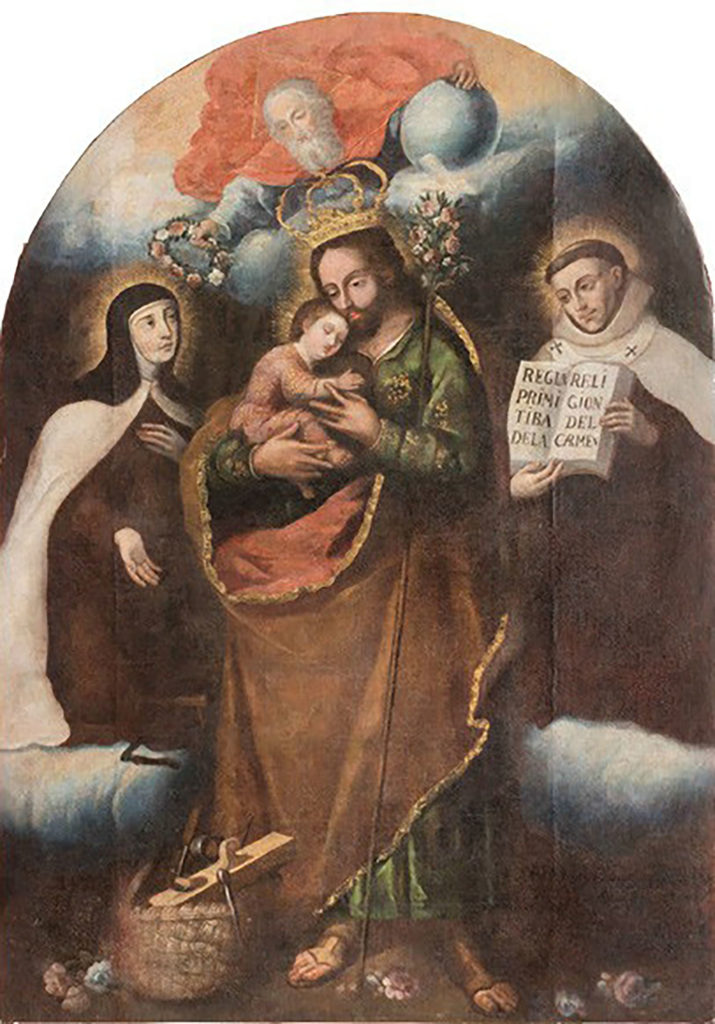Saints Devoted to St. Joseph
Saints Devoted to St. Joseph
Throughout Church history many saints have had a special devotion to St. Joseph, crediting him for many answered prayers and their personal growth in holiness. Read a few testimonies about the power of St. Joseph’s intercession below.
St. Francis de Sales
The great Doctor of the Church and bishop of Geneva, St. Francis de Sales, was not only a faithful devotee of the Guardian of the Redeemer but his avid proponent as well.
St. Francis de Sales made St. Joseph the special Patron of the religious order he founded, the Order of the Visitation. In addition to naming at least one of his parishes in his honor, he set Joseph as the model of the interior life and contemplative prayer for his own spiritual daughters–and in particular for the novices, who were to look upon St. Joseph as their novice “master” and guide (A Manual of Practical Devotion to the Glorious Patriarch St. Joseph, translated by Fr. Patrignani, p. 78).
St. Teresa of Avila
In her autobiography, the holy Carmelite mystic and reformer sings the praises of her holy father, St. Joseph, and gives proof of his powerful intercession:
“I took for my patron and lord the glorious St. Joseph, and recommended myself earnestly to him. I saw clearly that both out of this my present trouble, and out of others of greater importance, relating to my honour and the loss of my soul, this my father and lord delivered me, and rendered me greater services than I knew how to ask for.
I cannot call to mind that I have ever asked him at any time for anything which he has not granted; and I am filled with amazement when I consider the great favours which God hath given me through this blessed Saint; the dangers from which he hath delivered me, both of body and of soul.
To other Saints, our Lord seems to have given grace to succour men in some special necessity; but to this glorious Saint, I know by experience, to help us in all: and our Lord would have us understand that as He was Himself subject to him upon earth—for St. Joseph having the title of father, and being His guardian, could command Him—so now in heaven He performs all his petitions. […]
Would that I could persuade all men to be devout to this glorious Saint; for I know by long experience what blessings he can obtain for us from God. I have never known any one who was really devout to him, and who honoured him by particular services, who did not visibly grow more and more in virtue; for he helps in a special way those souls who commend themselves to him. […]
But I ask, for the love of God, that he who does not believe me will make the trial for himself—when he will see by experience the great good that results from commending oneself to this glorious patriarch, and being devout to him.
Those who give themselves to prayer should in a special manner have always a devotion to St. Joseph; for I know not how any man can think of the Queen of the angels, during the time that she suffered so much with the Infant Jesus, without giving thanks to St. Joseph for the services he rendered them then. He who cannot find any one to teach him how to pray, let him take this glorious Saint for his master, and he will not wander out of the way.”
(Autobiography of St. Teresa of Avila, chapter 6)
St. Teresa also makes clear the best reason to love and to have recourse to St. Joseph: Jesus and Mary did so! In a vision of Our Lady and St. Joseph, St. Teresa recounts:
“Our Lady seemed at once to take me by both hands. She said that I pleased her very much by being devoted to the glorious St. Joseph.”
(St. Teresa’s Life, as quoted in Dr. Mark Miravalle’s Meet Your Spiritual Father: an Introduction to St. Joseph published by Lighthouse Catholic Media/Marian Press)

Ven. Margaret of the Most Holy Sacrament
This holy Carmelite, known endearingly as the “Spouse of His Holy Infancy,” loved to meditate on the Childhood of Jesus and His life with Mary and Joseph. By her own example of love and devotion, she encourages all Christians to venerate St. Joseph as the worthy spouse of the Mother of God and the guardian of the “Immaculate Word”. In writing to a friend in religious life who had been assigned as an assistant to another sister, Venerable Margaret of the Most Holy Sacrament reminds us to labor in union with St. Joseph in the midst of the tasks of everyday life:
“I am delighted to find you installed in your present post. I conjure you to unite yourself to our dear and amiable Child Jesus, who, in St. Joseph’s workshop, did not consider Himself the master, but merely as an assistant. Unite your labors to those of that Blessed Child: accustom yourself to look upon the sister whom you have been appointed to assist, in the same light as that in which He considered St. Joseph. I am also an assistant to one of our sisters, and I will endeavor to be faithful to the practices which I now recommend to you.”
(A Manual of Practical Devotion to the Glorious Patriarch St. Joseph, pp. 89-90)
St. Faustina Kowalska
St. Faustina highlights the role of the Foster Father of Jesus, the King of Mercy, in drawing souls to the merciful Heart of God:
“St. Joseph urged me to have a constant devotion to him. He himself told me to recite three prayers [the Our Father, Hail Mary, and Glory be] and the Memorare once every day. He looked at me with great kindness and gave me to know how much he is supporting this work [of mercy]. He has promised me this special help and protection. I recite the requested prayers every day and feel his special protection.”
(Diary of St. Faustina, 1203)
The Memorare prayer referred to by St. Faustina is one addressed to St. Joseph himself that her Congregation prayed each day:
“Remember, O most pure spouse of Mary, and my dearly beloved guardian, St. Joseph, that never was it known that anyone who invoked your care and requested your help was left without consolation. Inspired with this confidence, I come to you and with all the ardor of my spirit I commend myself to you. Do not reject my prayer, O Foster Father of the Savior, but graciously receive and answer it. Amen.”
(This Memorare is quoted from Dr. Mark Miravalle’s Meet Your Spiritual Father, p. 141). Miravalle, Mark I. Meet Your Spiritual Father: a Brief Introduction to St. Joseph. Lighthouse Catholic Media/ Marian Press, 2015.)
St. Josemaría Escrivá
On St. Joseph’s Faith
“He kept the commandments of God without wavering, even though the meaning of those commandments was sometimes obscure or their relation to the rest of the divine plan hidden from him… Joseph’s faith does not falter, he obeys quickly and to the letter.
To understand this lesson better, we should remember that Joseph’s faith is active, that his docility is not a passive submission to the course of events. For the Christian’s faith has nothing whatever to do with conformity, inertia or lack of initiative.”
(Christ is Passing By, no. 42)
On Working Like St. Joseph
“You, who celebrate with me today this feast of St. Joseph, are men who work in different human professions; you have your own homes, you belong to so many different countries and have different languages. You have been educated in lecture halls or in factories and offices. You have worked in your profession for years, established professional and personal friendships with your colleagues, helped to solve the problems of your companies and your communities.
Well then: I remind you once again that all this is not foreign to God’s plan. Your human vocation is a part—an important part—of your divine vocation.
That is the reason why you must strive for holiness, giving a particular character to your human personality, a style to your life; contributing at the same time to the sanctification of others… sanctifying your work and your environment: the profession or job that fills your day, your home and family and country where you were born and which you love.”
(Christ is Passing By, no. 46)
On St. Joseph as Model of the Interior Life
“In human life, Joseph was Jesus’ master in their daily contact, full of refined affection, glad to deny himself to take better care of Jesus. Isn’t that reason enough for us to consider this just man, this holy patriarch, in whom the faith of the old covenant bears fruit, as a master of the interior life? Interior life is nothing but continual and direct conversation with Christ, so as to become one with him. And Joseph can tell us many things about Jesus.
Therefore, never neglect devotion to him—Ite ad Ioseph: “Go to Joseph”—as Christian tradition puts it in the words of the old testament (Gen 41:55).”
(Christ is Passing By, no. 56)
